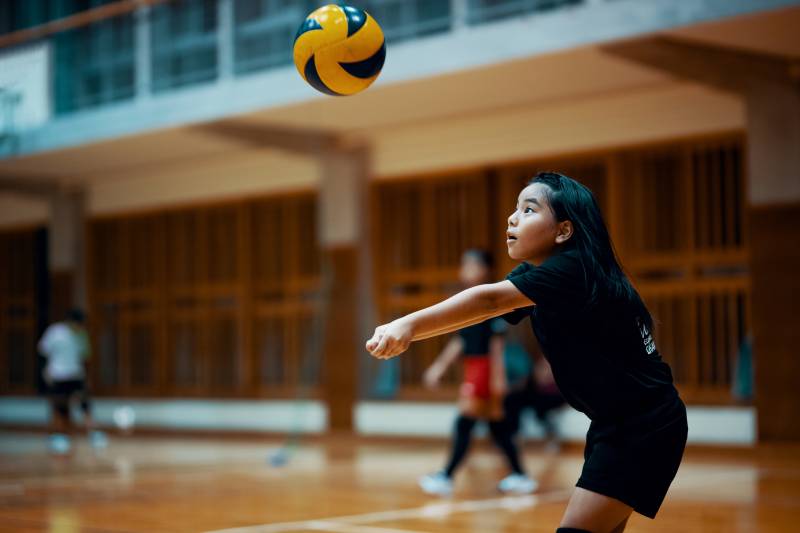Every coach has seen it. The gangly teenager lunging for a basketball, coming at it too fast and fumbling it out of bounds. The tentative hitter flailing at a pitch seconds after it has landed in the catcher’s glove—strike 3!—and then slumping off to the bench. The volatile first singles player smacking his serves into the net, again and again, growing more furious with every fault.
No matter the sport, it’s the coach’s job to help players fix their mistakes. But how best to correct them, so that instead of feeling wounded or demoralized, the kid feels motivated to improve? Coaches will typically opt for one of two approaches: identifying the mistake and offering blunt corrections or downplaying the error to boost the kid’s confidence.
Parents have the same default settings when confronted with their children’s mistakes and misbehavior: They’re tough enforcers or gentle protectors, sometimes vacillating between postures or falling for the compliment sandwich, a criticism hidden between two bits of feeble praise, which doesn’t fool anyone.
David Yeager, author of “10 to 25: The Science of Motivating Young People,” calls this predicament the Mentor’s Dilemma: the challenge in correcting a mentee’s work without shattering her confidence. It’s especially tricky to get right when working with adolescents, because young people need guidance that includes corrections, but they are also highly sensitive to criticism from respected adults.
Grown-ups will not break through to teenagers without appreciating teenagers’ neurobiological longing for status and respect, which Yeager equates to babies’ need for food and sleep. Yeager suggests adopting a mentor’s mindset, which is grounded in this basic understanding of the teenage brain.
The mentor’s mindset shatters the idea that influential adults must be either tough guys or a soft touch. “Neither approach is good,” Yeager told me. What adolescents need are corrections with encouragement. “Keep high standards and give more support,” he said. Honest feedback works when it is accompanied by moral support and clarity on how to get better.
Care and Expectations
To start, coaches need to make clear and frequent statements about their high expectations and sincere care for their players, especially given the power imbalance between them. Adolescents already suffer from the discrepancy between their need for esteem and their relative powerlessness in schools. If the coach is not transparent about his concern for the young person, even thoughtful criticism can be misinterpreted. The best coaches are “hyper-explicit” about caring for the kids on the team, Yeager said, so that the teenagers understand that the coaches’ corrections are motivated by genuine concern rather than the urge to control. Adults who work with young people may not realize how top-of-mind the imbalance of power between them weighs on adolescents.
Effective coach mentors also focus strictly on the process rather than outcomes. When coaches celebrate wins and criticize mistakes, they’re suggesting that what matters most is the result, not player growth. It’s more motivating to help athletes develop what they can control—their form, mechanics, attitude, effort—and to let the result take care of itself. A longtime coach of multiple sports, Yeager also encourages accumulating data on players and sharing it with them to inspire effort. Tangible progress in the weightroom, for example, can motivate athletes to improve.
Real Questions for Real Answers
Rather than tell players what they did wrong, a wise coach also asks questions to elicit change. But not any old questions: asking a detached 10th grade basketball player why his head isn’t in the game will not prompt reflection or inspire improvement. What mentors do is ask genuine questions that are grounded in a desire to learn what the player is thinking and that reveal an understanding of the young person’s perspective. Such questioning could sound like this: “I appreciate that you have a lot of distractions this week with mid-terms. I also know that you care about improving your game. Can you help me understand what you think is slowing you down on the court?”
Thoughtful questions build relationships, promote collaboration and spur improvement.
Research found that kids in the classroom are motivated to persevere during (what most would consider) boring drills when they could connect those activities to a larger purpose: kids who had been asked to consider what issues or problems mattered to them, then reminded that a sound education and hard work would equip them to address these concerns, were better able to focus on the unglamorous side of learning. The same logic holds in sports. Coach mentors who find a way to connect drills, stretching and other ho-hum activities as a necessary steppingstone to the players’ purpose beyond mere self-interest—like supporting the team—will inspire more concentration and effort.
Yeager explains how Chip Engelland, a shooting coach for several top NBA players, married high standards with ample support to improve athletes’ games. When analyzing one player’s flawed shot, Engelland was direct about what needed to change while expressing confidence in the player’s ability to do so. He organized rigorous practices that focused on the precise skills the player needed to master. When the young man erred, Engelland asked questions—starting with “how did that feel?”—to nudge the player to figure out for himself how to adjust. Engelland maintained his demanding standards and offered consistent support despite frustrations and setbacks, all the while promoting the player’s autonomy. “’As a coach, I’m constantly trying to get young players to take feedback without feeling threatened,’” he told Yeager, adding that, “’it’s fundamentally about the balance between challenge and safety.’”
Mentors like Engelland start from the position that young people are capable and good-natured. Though their behavior might seem foolish or illogical to an adult, their position makes sense to them.
It’s best to embrace “the most generous interpretation” of an adolescent’s conduct, as advised by parenting expert Dr. Becky Kennedy.
Some of the most skilled coaches have demonstrated that the right kind of encouragement and feedback can help teens meet high standards. MindShift










